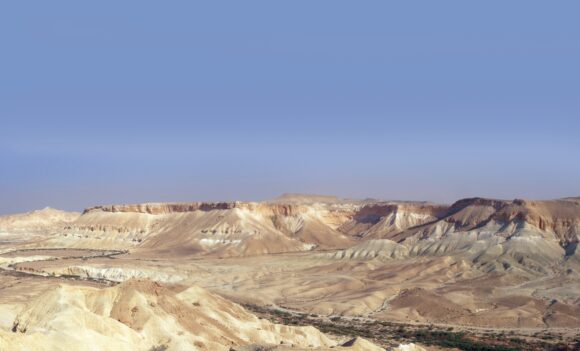ONCE MORE the twelve tribes trekked back into the wilderness, away from the land they had rejected. They were in a mood to complain. Before long a conspiracy developed. The layout of the camp set the tents of the tribe of Reuben near to Levi, for Reuben and Levi were brothers (Genesis 35:23). The ringleader of the mutiny was Korah from the tribe of Levi, a cousin of Moses. With him were Dathan, Abiram and On, three brothers from the nearby tribe of Reuben.
They assembled themselves together against Moses and against Aaron and said to them, “You have gone too far! For all in the congregation are holy, every one of them, and the Lord is among them. Why then do you exalt yourselves above the assembly of the Lord?” (Numbers 16:3).
Korah claimed the right to share the role with Moses and Aaron of leading the people. We see this type of rivalry all the time in the workplace and in politics. Jealousy is a feature of human nature.
Moses’ Response
Moses could have called for the mutineers to be executed. Instead, he fell upon his face (v. 4). Probably he was praying. When he stood up, he proposed a straightforward test to show whom God wanted to lead the people. There were 250 men standing with Korah. Right, said Moses, tomorrow morning let each man bring a censer to the Tabernacle, together with incense. Then God will show who are qualified to be His priests.
Dathan and Abiram were also summoned to Moses’ tent, but they refused to attend. ‘Is it a small thing that you have brought us up out of a land flowing with milk and honey, to kill us in the wilderness,’ they complained, ‘that you must also make yourself a prince over us?’ (v. 13). It was a travesty of the truth. God had described the Promised Land to which He was leading them as ‘a land flowing with milk and honey’ (Exodus 3:8). To claim that the land of their slavery was a land of milk and honey was to mock that promise, and to assert that Moses had taken them away from it so that he could help himself to their goods was pure slander.
All night the congregation were kept awake by the 250 rebels hammering away at their new bronze censers. In the morning they assembled at the entrance door to the Tabernacle. The people stood at a distance to watch. Suddenly the glory of God flared up, and His angel commanded Moses and Aaron to stand back. They begged him not to punish all the people, only those who led the rebellion. They commanded the people to stand well clear of the tents of the three chief mutineers. On is not mentioned, so he may have had second thoughts and left the rebels.
While they all watched, the earth shook. A huge pit opened up underneath the tents of the three men. In a moment they and their families were swallowed up by the earth, never to be seen again. Next the fire of God fell on the 250 men with their censers. They were burnt to ashes, leaving only Aaron and his censer still standing. It was clear whom God wanted to be His priest.
The Man God Chose
The rebellion was not quite over. Next day the people assembled again outside Moses’ tent. ‘You have killed the people of the Lord’, they cried (Numbers 16:41). They were punished by a sudden plague.
But God instructed Moses to set up a test to show once for all that it was the tribe of Levi He wanted to lead the people. The leader of each of the twelve tribes was told to bring a wooden rod with his name on it to the Tabernacle. Next morning they were brought out, and each took his rod. Eleven rods were unchanged. But the twelfth, with Aaron’s name, had grown almond buds, flowers and nuts. There could be no doubt. There was no possibility of fraud. Levi was God’s choice (Numbers 17:8).
To ensure the lesson would not be forgotten, God had the 250 censers of the rebels beaten flat and nailed to the walls of the altar. Afterwards, whenever an Israelite came to offer a sacrifice, he was confronted with a powerful warning about what happens when we challenge God. Aaron’s rod was placed inside the ark in the Most Holy Place for a permanent reminder that only one man could act as the intermediary between God and His people.
We know from the New Testament book of Hebrews that Aaron’s role was in time replaced by the work of Jesus. ‘When Christ appeared as a high priest of the good things that have come… he entered once for all into the holy places, not by means of the blood of goats and calves but by means of his own blood, thus securing an eternal redemption’ (Hebrews 9:11–12).
The almond rod has its own story. It is the first tree to blossom in spring after the dark days of winter. The Jews call it ‘the awakening tree’. It is a fitting symbol for the Lord Jesus, the first man to rise from the dead to be given immortality.
David M Pearce


